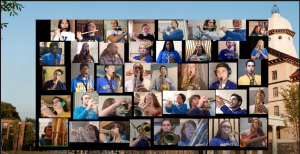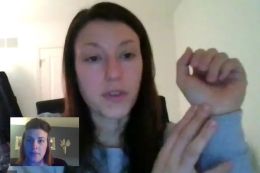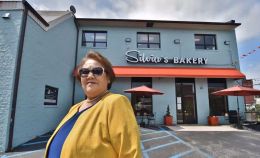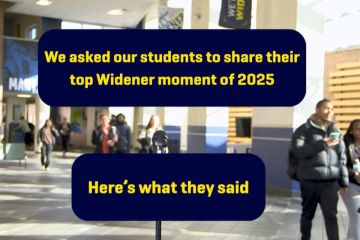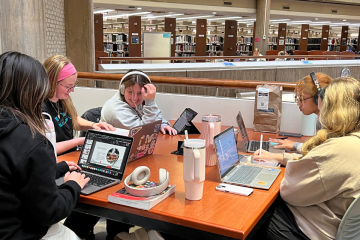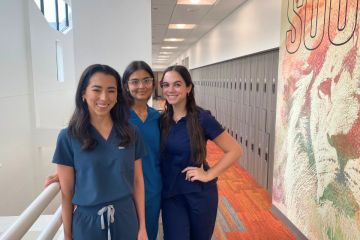Widener Community Emerges from the Pandemic Stronger and More Resilient

As most Widener faculty and staff pivoted from a traditional work environment to working remotely at the start of the pandemic, they adopted new technologies and innovative ways to carry on with their various missions. Putting health and safety first, Widener's leaders worked with each staff and faculty member individually to ensure everyone had the resources and technical training to perform their work effectively from home.
Cybersecurity and data protection are ongoing concerns, especially in a remote work environment, and Information Technology Services (ITS) enhanced security measures across platforms in 2020 and has been conducting ongoing cybersecurity training for all employees. In addition, ITS provided all faculty, staff, and students with licensed Zoom accounts and a Zoom Resources webpage with training and tips. Zoom enables groups to meet virtually face-to-face and record the meetings for future reference. ITS also outfitted the university community with Microsoft Office 365 applications, including Teams, a powerful tool for online project management collaboration, as well as Office 365 training and support.
Diversity, equity, and inclusion are key values at Widener, and ITS ensured Widener's Zoom accounts have the closed caption/live transcript feature and informed faculty and staff in how to use it.
"This exciting feature helps us meet our goal of creating accessible content for all," said Joanne Caione-Keating, director of Teaching and Learning Technologies.
When the pandemic is over and everyone is back on campus, faculty and staff will still be able to use Zoom for meetings. This enables people who would have difficulty attending in person to participate and makes meetings more accessible for colleagues across all three campuses. Sessions can be recorded on Zoom for later reference, and Zoom transcripts remove the need for taking notes and minutes.
In addition to adapting to new technologies to continue operations during the pandemic, other examples of how the Widener community has stayed connected virtually include innovative collaborations between organizations, virtual training programs, and online celebratory and informational hubs.
Students Creatively Connect from Near and Far
With so many students taking classes remotely, living miles – if not states – away from campus, the challenge of keeping them engaged and active in university life has been difficult but rewarding. The Office of Student Engagement (OSE) and individual clubs and organizations have faced the hurdles with flexibility, ingenuity, and creativity.
“It’s been perseverance and persistence. Students have been thinking about how to take an idea, how to retrain their brain, break out of the box, and find a new way,” said Jeanine Snow-Gephart, director of student involvement. “Our students have risen to the occasion.”
In the last year, there have been social media contests, virtual salsa and cooking classes, and a fan-favorite series of take-home activities in which students either pick up or are shipped supplies to participate in craft projects at home. Organizations have employed new technology to connect students and have accessed an even greater pool of outside guests to offer virtual events.
Another silver lining of pandemic life has been greater collaboration between Widener organizations, as clubs have teamed up to present programming.
“The virtual world has allowed us to be so creative in figuring out how to do things for the community. It’s been a challenge but a good challenge,” said Charity Williams ’21, a Fraternity and Sorority Life specialist in OSE, who also serves as president of the Intercultural Greek Council and secretary of Delta Sigma Theta Sorority, Incorporated.
Even the Widener Marching Band has found ways to perform together despite COVID restrictions and the lost 2020 football season. The band created a hybrid video version of the Widener alma mater, Blue & Gold. Submitted at-home video performances were edited together with footage of musicians and color guard members performing on campus — outside, masked, and socially distanced.
The band’s drumline also came together on campus to film PMC #3, a traditional drum cadence previously performed by the Pennsylvania Military College drum section.
“It’s important to keep people together, and COVID didn’t really stop us from that. It’s been especially beneficial for our first-year students, many of whom were completely virtual in the fall, so they get the experience to meet and interact with people,” said Meghan Bell ’21, ’23, drum major. “The band program is still growing and evolving, and we want to show prospective students we’re still able to play.”
Nursing Students at the Harrisburg Campus Train for the Future with a Telehealth Pilot Program
The use of telehealth and telemedicine has increased dramatically during the pandemic in order to safely care for patients. For many health care professionals, the move to telehealth happened nearly overnight without warning or time to prepare. Widener's physical therapy students, for example, adopted telehealth training to care for their patients. And a new pilot program implemented in Widener's graduate nursing program is teaching students the techniques and skills to serve as care providers both in-person and online.
“To translate an in-person visit to a remote visit is not always as easy as you’d think,” said Kathleen Sheikh, assistant professor and assistant dean of nursing at the university’s Harrisburg campus.
From maintaining eye contact to acquiring consent and complying with HIPPA regulations, there are a number of factors and best practices that come into play in a virtual setting.
“We need to give our students an introduction to telehealth etiquette, like how to conduct an exam without actually touching a patient, what is appropriate for telehealth and what is not,” said Sheikh.
Telehealth lessons have been integrated in an advanced physical assessment course for students in the graduate program this semester with support from a gift by Tom Bown ‘67, a 20-year member of Widener's Board of Trustees who now serves as an honorary member, and his wife, Bonnie.
When students are not on campus practicing clinical skills in the lab, they are online running a simulated telehealth appointment. Alternating between the role of patient and nurse, students work in pairs to conduct telehealth visits to practice the skills and techniques that are specific to virtual appointments.
Sheikh believes that telehealth is here to stay in the nursing curriculum because it not only provides students with a more robust set of skills, but it also opens the doors to new job opportunities.
“[Telehealth] is not going to go away, and the idea that even if it’s not used as much in the future, it will be an expectation of practice,” said Sheikh.
Widener's Celebrative Commencement Hub Is Here to Stay
The 2020 commencement season was a celebration unlike any other. When COVID-19 interrupted the annual in-person event, the university moved quickly to create its first-ever virtual commencement hub to host commencement-related content and recognize the pinnacle achievements of a thousand plus graduates.
Hosted on the university’s website, the hub created an experience for graduates and their guests to mark the milestone occasion from a safe distance. Along with graduate stories and photos, the hub featured congratulatory video messages from President Julie E. Wollman, undergraduate and graduate student speakers, and Dr. Nick Caputo '03 who shared a message with students from his workplace at Lincoln Medical Center in New York City.
As an emergency room physician, Caputo shared his experience treating COVID-19 patients on the front-line in the Bronx. While acknowledging their academic achievements, Caputo spoke to the severity of the virus and the importance of staying home and social distancing even during such a momentous occasion. His inspiring message reminded graduates and everyone at Widener of the role we play in the health of our community and beyond.
The hub also boasted interactive features including a social media wall that displayed posts from users both inside and outside of the Widener community and a Celebration of Graduates that featured individual personalized slides announcing each graduate by name and degree.
From start to finish, the hub was a one-stop resource for graduates to connect with one another, share in the celebration, and reflect on their time at Widener. The commencement hub will be back in 2021, along with in-person and drive-through ceremony options, and in years to come.
Homecoming in 2020 Expanded Connections and Brought Many Side Benefits
Widener’s 2020 homecoming celebration looked different from previous years, but adjustments made to accommodate social distancing during the pandemic had many side benefits.
Due to the virtual format, the university extended the experience to a week-long celebration and offered a variety of new programming and opportunities for online engagement to foster connections among students, alumni, families, and the whole Widener University community.
“Our alumni turned out in force for our remote homecoming. Through numerous virtual programs, alumni and the Pride community were able to celebrate homecoming wherever they were, from attending a live professional development workshop to participating in our first-ever Stride for the Pride Virtual Family Fun Run. We missed the in-person campus traditions, but the new virtual events and connections made 2020 homecoming exciting and valuable,” Jessica Lista, executive director of Alumni Engagement, said.
Nearly 570 people attended remote homecoming events. Working with multiple university partners, the Office of Alumni Engagement planned various experiences that included everything from a strategic job searching workshop specifically for 2020 graduates, presented by the Office of Career Design and Development, to a discussion with Dean Anthony Wheeler on his vision for the School of Business Administration. Another SBA panel explored the changing nature of work in an era of automation and artificial intelligence. There was a talk with the CEO of the National League for Nursing on diversity, inclusion, and social justice; an open mic arts celebration; and the ever-popular virtual stargazing session. Events were open to all members of the community, including students.
“We weren’t in person, but we were still connected,” Lista said. “And now, we’re considering how to build on that even after it is safe to gather in large, in-person groups again. Homecoming 2020 taught us a lot about the value of digital connections.”
The Widener Small Business Development Center Helps Businesses Survive and Thrive during the Pandemic
The Widener Small Business Development Center (SBDC) has also found ways to connect virtually to expand assistance to small business owners during the pandemic via tele-consulting, webinars, and master classes.
The Widener SBDC team received additional Coronavirus Aid, Relief, and Economic Security (CARES) Act funds, enabling the team to help more than 800 additional clients access over $10 million in emergency relief funds. In addition, SBDC designed and delivered more than 65 virtual webinars, according to SBDC Director Lenin Agudo.
These virtual seminars benefited small business owners like Silvia Paulino, owner of Silvia’s Bakery in Philadelphia. She joined the Spanish-language webinars, including “Pequeño Empresario VS. Coronavirus (Small Business Owner VS. Coronavirus),” and, “Reinventa y Reactiva tu Negocio (Reinvent and Reactivate Your Business),” which acted as a guide for navigating the difficulties of running a business during the pandemic.
The webinars broke down how small business owners like her could maintain what they had built and bounce back even stronger.
“The federal support for small businesses in Pennsylvania provided a lifeline to thousands of families and small businesses who would otherwise have succumbed,” Agudo said. “The Widener SBDC is grateful to have been able to provide these virtual webinars to help with the economic recovery in the region.”
Widener Is Stronger, More Agile and Resilient
Widener faculty and staff are more flexible, capable, and effective than they were before the pandemic. As a result of adapting to remote operations and committing to staying connected virtually, Widener is now prepared to carry on in the face of natural disasters, severe weather, and emergency situations that resulted in closing the university in the past. Now, in our 200th anniversary year, Widener is stronger than before and equipped to help our students and community thrive in an uncertain future.

